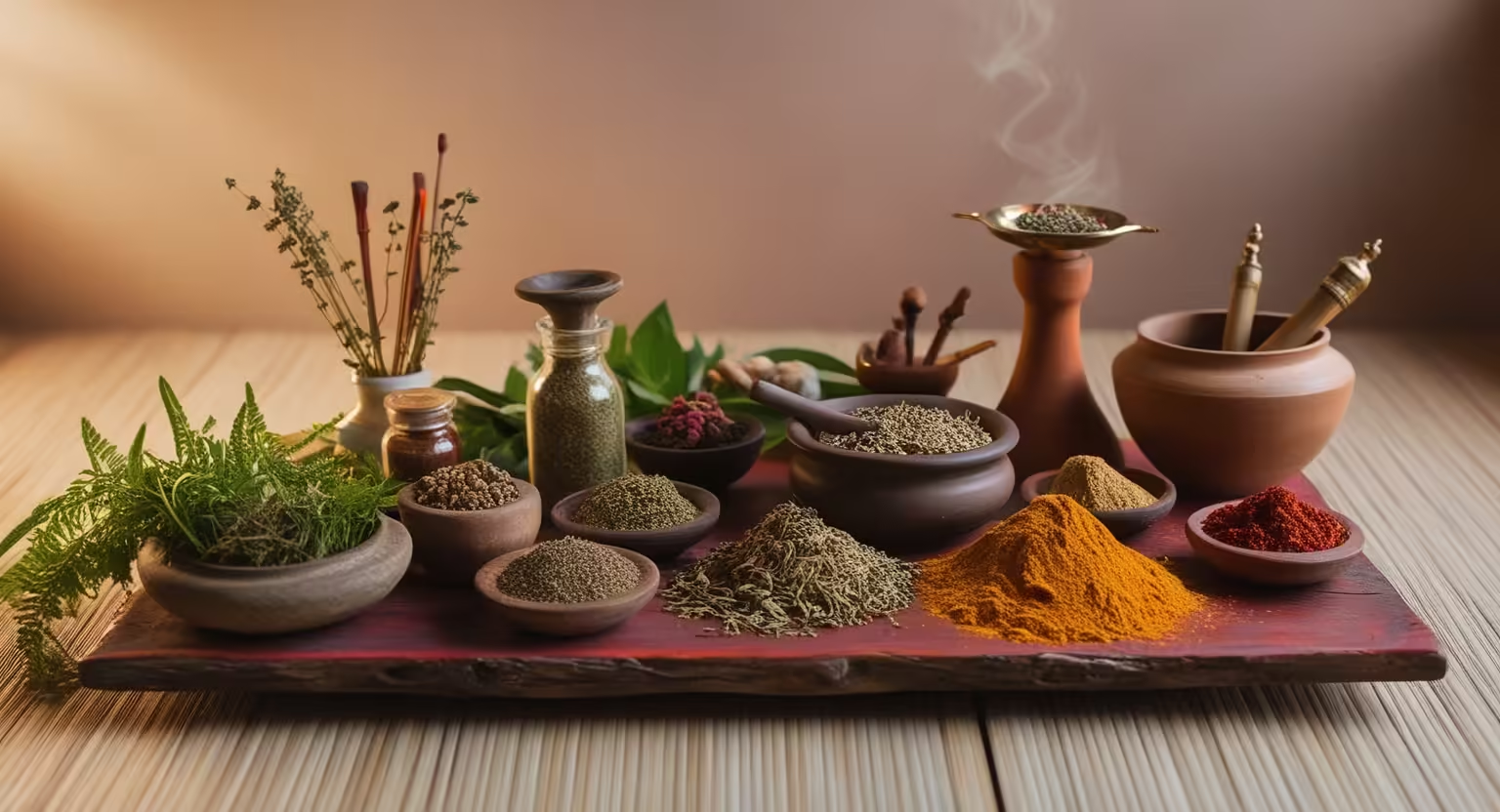Ayurveda, with its rich history and profound insights, provides invaluable guidance for attaining peak health and vitality. In this blog, we will delve into a variety of Ayurvedic health tips that can revolutionize your life and assist you in maintaining a harmonious lifestyle.
Table of Contents
ToggleUnderstanding Ayurveda
Ayurveda, originating over 5,000 years ago in India, focuses on promoting health through natural and holistic approaches. It emphasizes achieving wellness by balancing three fundamental energies or doshas: Vata, Pitta, and Kapha. Each individual possesses a unique constitution, and understanding your dominant dosha can guide you in tailoring your lifestyle and health practices to attain equilibrium.
The Three Doshas: Vata, Pitta, and Kapha
- Vata Dosha: Composed of space and air, Vata dosha governs movement and communication in the body. People with a dominant Vata dosha are often energetic, creative, and quick-thinking but may struggle with anxiety, dryness, and irregular digestion.
- Pitta Dosha: Made up of fire and water, Pitta dosha controls digestion, metabolism, and energy production. Those with a dominant Pitta dosha are typically ambitious, intelligent, and driven but can experience anger, inflammation, and digestive issues when out of balance.
- Kapha Dosha: Comprised of earth and water, Kapha dosha is responsible for structure, stability, and lubrication in the body. Individuals with a dominant Kapha dosha are usually calm, loving, and grounded but may face challenges like weight gain, lethargy, and congestion when imbalanced.

Daily Routine (Dinacharya)
- Wake Up Early: Rise before sunrise to align your body with the natural rhythms of the day. This practice helps in maintaining a healthy sleep cycle and promotes mental clarity.
- Tongue Scraping: Use a tongue scraper daily to remove toxins and improve oral health. It enhances oral hygiene and supports a healthy sense of taste.
- Oil Pulling: Swish sesame or coconut oil in your mouth for a few minutes daily to detoxify and promote oral hygiene. This practice reduces harmful bacteria, improves gum health, and whitens teeth.
- Exercise: Engage in moderate exercise like yoga or walking daily to keep your body active and balanced. Regular physical activity helps maintain a healthy weight, boosts energy levels, and improves mood.
- Meditation and Pranayama: Incorporate daily meditation and breathing exercises to calm the mind, reduce stress, and enhance mental clarity. These practices also promote emotional balance and overall well-being.
Implementing these practices into your daily routine can significantly contribute to your health and well-being according to Ayurvedic principles.
Dietary Guidelines
- Eat According to Your Dosha: Choose foods that balance your dominant dosha. For example, Vata types should opt for warm, moist foods, while Pitta types benefit from cooling, less spicy foods.
- Eat Fresh and Seasonal Foods: Consume fresh, locally grown, and seasonal foods to maintain balance and harmony with nature. Eating seasonal foods ensures you get the nutrients your body needs at different times of the year.
- Mindful Eating: Eat in a calm and relaxed environment, chew your food thoroughly, and avoid overeating. Mindful eating enhances digestion, prevents overeating, and allows you to fully enjoy your meals.
- Spices and Herbs: Incorporate Ayurvedic spices and herbs like turmeric, ginger, cumin, and coriander into your meals for their health benefits. These spices aid digestion, boost immunity, and add flavor to your food.

Herbal Remedies
Ayurveda uses various herbs to promote health and treat ailments. Here are some commonly used herbs:
- Ashwagandha: Known for its rejuvenating properties, it helps reduce stress and improve vitality. Ashwagandha also supports thyroid function, enhances muscle strength, and boosts cognitive function.
- Turmeric: A powerful anti-inflammatory and antioxidant, it supports overall health. Turmeric is beneficial for heart health, joint function, and skin health.
- Tulsi (Holy Basil): Enhances immunity and helps manage respiratory conditions. Tulsi also has adaptogenic properties, helping the body cope with stress.
- Guduchi (Giloy): This herb is renowned for its immune-boosting properties. Guduchi supports liver health, aids in detoxification, and helps manage chronic fevers.
Lifestyle Tips
Ayurveda offers lifestyle tips to maintain balance:
- Healthy Sleep Patterns: Embrace early bedtimes and wake-up routines to align with natural circadian rhythms. This supports overall well-being.
- Warm Water Hydration: Maintain hydration by consistently consuming warm water. This practice supports digestion and helps in detoxifying your system.
- Self-Massage (Abhyanga): Incorporate regular self-massage with warm oil into your routine. Abhyanga boosts circulation, reduces stress, improves sleep quality, and nourishes your skin.
- Ayurvedic Detox (Panchakarma): Periodically undergo Ayurvedic detoxification to eliminate toxins and achieve balance. Panchakarma involves therapeutic massages, herbal treatments, and dietary changes to purify the body.
Seasonal Routines (Ritucharya)
- Spring: Focus on detoxification and light, cleansing foods. Include bitter greens, sprouts, and astringent foods in your diet to cleanse the body of accumulated toxins.
- Summer: Stay cool with hydrating foods and avoid excessive heat. Incorporate cooling foods like cucumber, watermelon, and mint into your diet to keep your body hydrated and cool.
- Fall: Ground yourself with warm, nourishing foods and practices. Include root vegetables, warm soups, and grounding grains like rice and quinoa in your diet to stabilize Vata energy.
- Winter: Keep warm with hearty, nutrient-dense foods and stay active. Incorporate warming spices like ginger, cinnamon, and cloves into your meals to support digestion and immunity.

In-Depth Tips for Each Dosha
Vata Dosha Tips:
- Diet: Favor warm, moist, and grounding foods such as cooked vegetables, whole grains, and warm milk. Avoid cold, dry, and raw foods which can increase Vata.
- Lifestyle: Maintain a regular routine, engage in calming activities like yoga and meditation, and ensure you get plenty of rest.
- Herbs: Include warming herbs like ginger, cinnamon, and ashwagandha to balance Vata.
Pitta Dosha Tips:
- Diet: Favor warm, moist, and grounding foods such as cooked vegetables, whole grains, and warm milk. Avoid cold, dry, and raw foods which can increase Vata
- Lifestyle: Maintain a regular routine, engage in calming activities like yoga and meditation, and ensure you get plenty of rest.
- Herbs: Include warming herbs like ginger, cinnamon, and ashwagandha to balance Vata.
Kapha Dosha Tips:
- Diet: Favor light, warm, and spicy foods such as legumes, vegetables, and spices like ginger and black pepper. Avoid heavy, oily, and sweet foods which can increase Kapha.
- Lifestyle: Stay active with regular exercise, avoid daytime naps, and incorporate stimulating activities into your routine.
- Herbs: Include warming and stimulating herbs like turmeric, black pepper, and tulsi to balance Kapha.

Specific Ayurvedic Practices
Self-Massage (Abhyanga): Abhyanga, the practice of self-massage with warm oil, is a key component of Ayurvedic health routines. Here’s how to perform Abhyanga:
- Choose the Right Oil: Select an oil suitable for your dosha. Sesame oil is generally good for Vata, coconut oil for Pitta, and mustard oil for Kapha.
- Massage Technique: Start with your scalp, using circular motions. Move to your face, neck, and shoulders, using long strokes on limbs and circular motions on joints.
- Duration: Spend at least 15-20 minutes on the massage.
- Post-Massage: Allow the oil to penetrate your skin for at least 30 minutes before taking a warm shower.
Oil Pulling: Oil pulling is an ancient Ayurvedic practice for oral health and detoxification. Here’s how to do it:
- Choose Your Oil: Use sesame or coconut oil.
- Quantity: Take about one tablespoon of oil.
- Swishing: Swish the oil around in your mouth for 15-20 minutes, ensuring it reaches all areas.
- Spit Out: Spit the oil into a trash can (avoid spitting into the sink to prevent clogging).
- Rinse: Rinse your mouth with warm water and brush your teeth as usual.
Triphala for Digestion: Triphala, a blend of three fruits (Amalaki, Bibhitaki, and Haritaki), is a renowned Ayurvedic remedy for digestion. Here’s how to use it:
- Triphala Powder: Take one teaspoon of Triphala powder.
- Warm Water: Mix it with a glass of warm water.
- Timing: Drink it before bedtime to support digestion and detoxification.
Detoxification (Panchakarma): Panchakarma is a comprehensive Ayurvedic detoxification process involving five main therapies:
- Vamana (Therapeutic Vomiting): Used to eliminate excess Kapha from the respiratory and gastrointestinal tract.
- Virechana (Purgation): Cleanses the small intestine and liver, removing Pitta toxins.
- Basti (Enema Therapy): Cleanses the colon and removes accumulated Vata toxins.
- Nasya (Nasal Administration): Clears excess Kapha from the nasal passages and sinuses.
- Raktamokshana (Bloodletting): Detoxifies the blood and removes toxins from the circulatory system.
Detoxification (Panchakarma): Panchakarma is a comprehensive Ayurvedic detoxification process involving five main therapies:
- Vamana (Therapeutic Vomiting): Used to eliminate excess Kapha from the respiratory and gastrointestinal tract.
- Virechana (Purgation): Cleanses the small intestine and liver, removing Pitta toxins.
- Nasya (Nasal Administration): Clears excess Kapha from the nasal passages and sinuses.
- Raktamokshana (Bloodletting): Detoxifies the blood and removes toxins from the circulatory system.
By embracing these Ayurvedic practices and integrating them into your daily routine, you can achieve a balanced and healthy life. Remember, Ayurveda is not just about treating illnesses but about maintaining overall well-being through mindful living and natural remedies.




One thought on “Well Health Ayurvedic Health Tips”